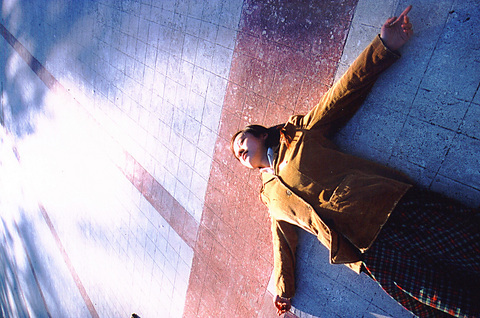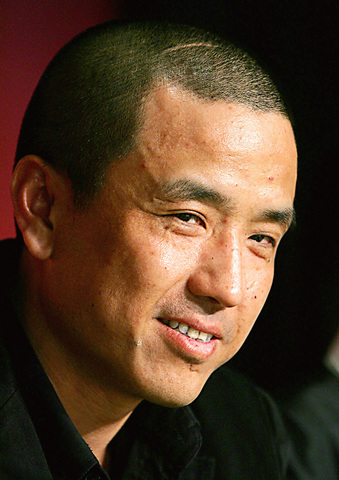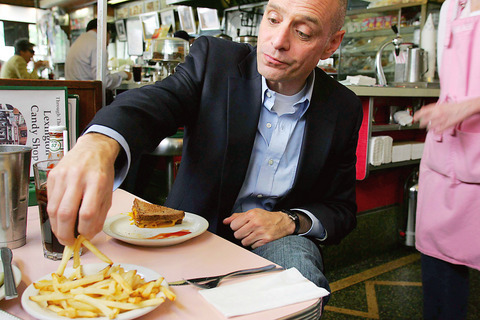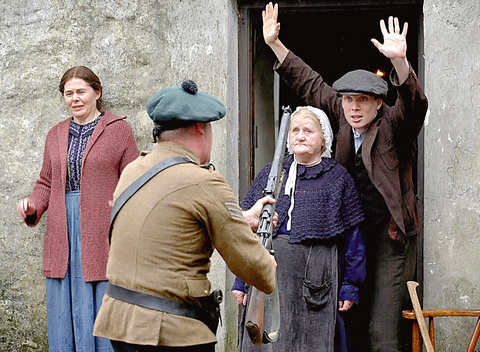With the manufactured hysteria over The Da Vinci Code now little more than a fast-fading hangover, the 59th Cannes Film Festival has begun in earnest. And just as they do every year, the programmers have proved that in between the critical grandstanding and the public-relations hyperbole there actually is room for art, or at the very least some satisfying films.
The first few days here have not yet produced any revelations, but filmgoers have again been able to tour the cinematic world, passing through Paris on the way to Paraguay and Tiananmen Square, where the politics are almost as hot as the sex.
Sex and politics are on full boil in Lou Ye's (

PHOTOS: AGENCIES
The trade papers have been running contra-dictory dispatches about Summer Palace, which may have been offered to Cannes without the film-maker's knowledge and without the sanction of Chinese censors. A Chinese producer claimed that Lou Ye would soon be on a plane back to Beijing, though he did appear at his news conference Thursday, and a representative for the film offered me placid assurances that the director was staying put. It would be a shame if this behind-the-scenes wrangling got in the way of the film, which beautifully blends the political with the personal much as Flaubert does in Sentimental Education, his moral history of a generation set against the backdrop of revolution, and Philippe Garrel does in Regular Lovers, his film about May 1968 and its aftermath.
The French touch is further evident in Summer Palace with its brief shot of the young Antoine Doinel running on the beach at the end of The 400 Blows. In this context Francois Truffaut's touchstone image, which speaks as much to the struggles faced by its young director as those of the character, is eloquently moving. It is also instructive because while Summer Palace was made in China and nods in the direction of the filmmaker's contemporary Jia Zhangke (
Directed by Paz Encina and paid for by money culled from more than a half-dozen countries (the Netherlands, Spain and, oddly enough given its economic straits, Argentina), Hamaca Paraguaya centers on two elderly peasants who are waiting for the rain much as Vladimir and Estragon wait for Godot, though with far fewer jokes. Watching this attractive exercise, which unfolds with great deliberation and without a single camera movement, I was again reminded that art-house cinema has as many of its own cliches and narrative tropes as Hollywood does. Encina's film, which takes place in 1935 during wartime, looks and sounds very good, and there is something intellectually bracing about a film that forces you to either accept its leisurely rhythms or hit the exit.

PHOTOS: AGENCIES
Still, given the dearth of Paraguayan cinema especially, it's somewhat disappointing that Encina's formalist rigor did not make room for a richer, more overt sense of Paraguayan time and place. My point isn't that filmmakers from countries with under-developed cinemas should bear the burden of cultural representation more heavily than those from rich countries with mature (or decadent) cinemas; a Paraguayan director should not have to speak for his homeland any more than, say, Brett Ratner, who is here representing American national interests with the latest X-Men movie. The benefits of advanced technology and porous borders are inarguable, including the increased ease with which we can consume world cinema, but does this accessibility also help dilute national voices?
One of the sustaining pleasures of foreign films, after all, is their foreign-ness, their differences. But with Hollywood continuing to loom large over the world, it is not always easy, even at Cannes, to find films that are not somehow under its influence. Even the British director and outspoken leftist Ken Loach has a period film in competition, The Wind That Shakes the Barley, that plays out like a Hollywood movie from the 1930s, only slower and with many more speeches. Cillian Murphy stars as a young doctor who joins the newly formed Irish Republican Army to fight British forces that in vile deed and elevated
volume greatly resemble movie-made Nazis. The story's contemporary undercurrent, specifically the birth of political extremism as a direct consequence of foreign occupation, is duly noted.

PHOTOS: AGENCIES
A different political reality is brought to devastating light in Richard Linklater's ferocious, fictionalized adaptation of Eric Schlosser's nonfiction bestseller Fast Food Nation, which, among other things, proves that when it comes to critiquing America, few do it better than outraged Americans. (Linklater, who has never had a film at Cannes before, this year has two: Fast Food Nation, which is screening in competition, and A Scanner Darkly, which is in Un Certain Regard.)
In Fast Food, Linklater and Schlosser, who wrote the screenplay together, trace a miscellany of characters from both sides of the American-Mexican border as they experience the perils of globalization. The most essential political film from an American director since Michael Moore's Fahrenheit 9/11, it may not turn you into a
vegetarian, but it will definitely make your think twice about our fast-food culture.

PHOTOS: AGENCIES

On April 26, The Lancet published a letter from two doctors at Taichung-based China Medical University Hospital (CMUH) warning that “Taiwan’s Health Care System is on the Brink of Collapse.” The authors said that “Years of policy inaction and mismanagement of resources have led to the National Health Insurance system operating under unsustainable conditions.” The pushback was immediate. Errors in the paper were quickly identified and publicized, to discredit the authors (the hospital apologized). CNA reported that CMUH said the letter described Taiwan in 2021 as having 62 nurses per 10,000 people, when the correct number was 78 nurses per 10,000

As we live longer, our risk of cognitive impairment is increasing. How can we delay the onset of symptoms? Do we have to give up every indulgence or can small changes make a difference? We asked neurologists for tips on how to keep our brains healthy for life. TAKE CARE OF YOUR HEALTH “All of the sensible things that apply to bodily health apply to brain health,” says Suzanne O’Sullivan, a consultant in neurology at the National Hospital for Neurology and Neurosurgery in London, and the author of The Age of Diagnosis. “When you’re 20, you can get away with absolute

May 5 to May 11 What started out as friction between Taiwanese students at Taichung First High School and a Japanese head cook escalated dramatically over the first two weeks of May 1927. It began on April 30 when the cook’s wife knew that lotus starch used in that night’s dinner had rat feces in it, but failed to inform staff until the meal was already prepared. The students believed that her silence was intentional, and filed a complaint. The school’s Japanese administrators sided with the cook’s family, dismissing the students as troublemakers and clamping down on their freedoms — with

As Donald Trump’s executive order in March led to the shuttering of Voice of America (VOA) — the global broadcaster whose roots date back to the fight against Nazi propaganda — he quickly attracted support from figures not used to aligning themselves with any US administration. Trump had ordered the US Agency for Global Media, the federal agency that funds VOA and other groups promoting independent journalism overseas, to be “eliminated to the maximum extent consistent with applicable law.” The decision suddenly halted programming in 49 languages to more than 425 million people. In Moscow, Margarita Simonyan, the hardline editor-in-chief of the